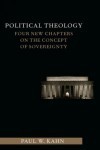
It is certainly interesting to see a reflection of myself in the response of another discipline, even if I sometimes have trouble recognizing that image. Most useful will be for me to address the meaning of the gap between the two different political theological enterprises represented in this discussion. I will begin by making clear what the idea of a political theology contributes to my project. Following that, I will defend some of the contested theoretical premises of my work. Finally, I will take up the hardest question that emerges from this discussion: is it really the case that my political theological project is non-normative? If there is an implicit normative claim in my work, then the reviewers are right to ask not just whether I have got my description of American politics right, but whether the ethical direction of my work can be supported.
It’s easy to read this week’s gospel as a warning of doom and gloom. It begins, after all, with this strict admonition, “Be Alert!” (v 23), and ends with the equally forceful command, “Keep awake!” (v 37). It’s as though Jesus has just shouted, “Watch out!” and thrown a ball of flaming fire into the crowd. But, of course, there is no fiery ball and so the question naturally is, “Watch out for what?” Within the pericope itself, the obvious answer becomes the awesome image that Jesus paints in verse 26: “The Son of Man coming in clouds with great power and glory.” And why should we be concerned? (Apart, of course, from the darkened moon and falling stars…) Because Jesus says the Son of Man is like a master returning and from there we write our own scripts of what wrath this master might bring. “Keep awake!” the Bible tells us, and we add, “Because if we sleep, we might be hit by that fiery ball!” And, indeed, for Matthew and Luke, who record this prediction as “a thief coming in the middle of the night,” rather than a master returning to his home, such fears may be warranted. But, for Mark, different dynamics are at play…
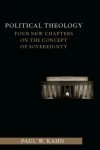
This book is a timely intervention within current debates about the role of religion, politics, philosophy and the public square. I was reading it as the Western World was once again reflecting (and in a not very coherent or analytical way) on the tenth anniversary of 9/11. As Kahn persuasively reminds us, international terrorism inextricably linked to religious imaginaries has forced liberal democracies and liberal intellectual disciplines to wake up to the real nature of politics: the themes of sovereign decision; the power of the exception rather than the bureaucratic norm; the lure of sacrifice and martyrdom; the will to act and choose authenticity rather than the use of reason or appeal to the norm. These are the seductive and destructive options that the international and religiously inspired terrorist offers us.
This was the defense of a banker – as seen in a BBC interview Monday 7th November. Later that day, the long-awaited St Paul’s Institute report on its survey of London-based bankers was published. In advance of this a decision was made to interview a young woman from within the profession to get her response to the suggestion that there was a lack of morality in the City of London. I was so staggered by some of her responses to this challenge that I felt bound to try to draw out the logical consequences of what she had said. What follows is exactly that.
Political Theology and the lectionary for Sunday, November 20, 2011.
To be sure, some smart evangelicals like Chuck Colson have abjured Rand in toto for her atheism, but her basic premise that government is the root of all evil and that unfettered capitalism is the answer for everything is as true as Trinitarianism in most evangelical’s minds and hearts, a position all but unheard of in Christianity prior to the 20th century.
To think this way as a Christian, one has to do strange things with the Scripture, such as with this week’s lectionary gospel passage for Christ the King from Matthew 25:31-46. The obfuscation of what’s going on in the text is accomplished by diminishing one aspect of the text, while overemphasizing another.
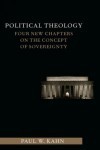
A sensible theologian gets used to the marginalization of theology in the mainstream academy. To find a book about the importance of political theology by a legal scholar at Yale is, however, cause for excitement. Paul Kahn’s exploration of, and extrapolation from, key themes in Carl Schmitt’s classic work goes beyond the usual association of political theology with fundamentalism and shows how even a liberal political order has a theology of its own. There has been no “resurgence” of religion; Kahn sees rightly that Mark Lilla’s “Great Separation” never happened, and that even liberal nation-states like the U.S. have taken on the aura of the sacred. Kahn’s insightful comments about nuclear warfare make this point acutely: “How is it that a political order that understands itself as characterized by the rule of law can hold forth the possibility of such destruction?” (11-12). It can only be because the nation has taken on an infinite value, and the popular sovereign, or nation as god, must retain its exceptional powers to act. In times of war, the President embodies the people like Christ embodies the whole (86). Liberal theories like that of Rawls have never properly come to grips with the violence of the nation-state and the persistence of sacrifice in modern politics.
All of this and more is expanded upon in quite brilliant fashion, and I remain grateful to Kahn for opening up new lines of inquiry that may have been heretofore closed to legal and political theorists. In the end, however, there is less convergence than first appears between political theology as Kahn understands it and what goes under the same name in the present journal.
Through ecstatic history, God acts upon himself, but not against himself, to reveal himself to those who are oppressed and violated by unjust power structures. In saying that God acts upon himself, what I mean is that God, already at work in history, dispenses divine revelation such that Spirit meets Spirit. God’s Spirit meets itself in radical instances that revise and recreate the event that constitutes human history.
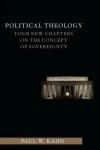
Kahn’s book is intriguing and in many places insightful, conversant in theoretical literature ranging from that of Giorgio Agamben to that of Brian Leiter. I have two worries, one about Kahn’s similarity to Schmitt and another about Kahn’s difference from Schmitt. I worry that the richness of Schmitt’s treatment of theology is diminished in Kahn’s treatment, with theology being reduced to religion – religion that sounds quite liberal and quite Protestant. And I worry that Kahn, like Schmitt, may not provide sufficient space for difference (racial, gender, class, and even religious) in his constructive account. I will approach these worries indirectly, after first rehearsing some of Kahn’s discussion of sovereignty.
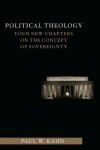
In the October 13 issue of the New York Review of Books, Mark Danner published a critique of the Bush administration’s policy on torture, under the title “Our State of Exception”. He didn’t give Carl Schmitt (or Paul Kahn) credit, but he could have. When the intellectual history of the past generation is written, one of the stranger items will be the unexpected resurrection of a sinister figure who might have seemed buried and forgotten, except for his admirers on the far right wing of respectable discourse.
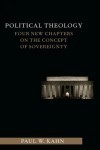
At this moment of extreme political intensity, Paul W. Kahn’s new book, Political Theology, appears as a timely meditation. By means of a sustained engagement with the controversial German legal theorist Carl Schmitt’s text of the same name, Kahn attempts to demonstrate that behind our seemingly liberal, constitutional order is a deep faith in the sacred character the state and of popular sovereignty. One is tempted to read Kahn’s juxtaposition of the discourses of (liberal) political theory and political theology as a commentary on struggle between the Obama Administration and the contemporary Republican (and Tea) Party—the one stressing reason, deliberation, pragmatism, compromise; the other embracing faith, will, power, sacrifice. Kahn, however, is more subtle than that. His slim volume is a provocative, sometimes frustrating, sometimes perplexing read, providing much food for thought, and also, I can imagine, for fights.
